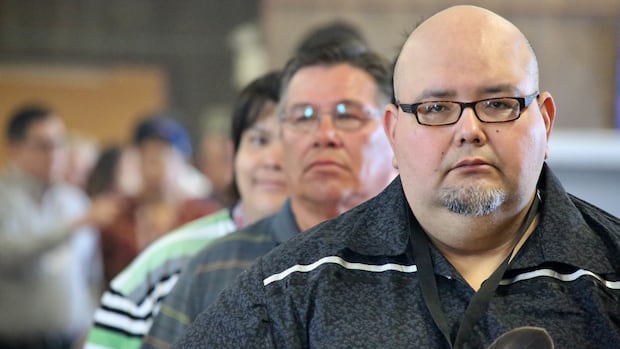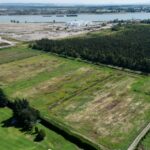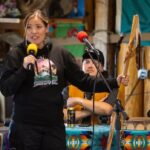LondonAuditor General Karen Hogan found Indigenous Services Canada has fallen far behind in implementing numerous recommendations from past department audits, despite a near-doubling in department spending since 2019.System a ‘bloated, colonial bureaucracy’ more interested in micromanaging: Grand ChiefMatthew Trevithick · CBC News · Posted: Oct 25, 2025 5:00 AM EDT | Last Updated: October 25Listen to this articleEstimated 5 minutesJoel Abram of Oneida Nation of the Thames First Nation is Grand Chief of the Association of Iroquois and Allied Indians. (Derek Spalding/CBC)Indigenous leaders in the London area say the findings of this week’s scathing federal auditor general’s report about Indigenous Services Canada (ISC) come as no surprise to them.Auditor general Karen Hogan found the department has fallen far behind in implementing numerous recommendations from past department audits, despite a near-doubling in spending since 2019.As a result, First Nations have been left to face persistent barriers accessing health care, safe drinking water and emergency management services, the report says.”Sustained focus from Indigenous Services Canada to redesign how it delivers programs and collaborating with First Nations to improve their capacity are important steps for resolving these persistent issues, improving outcomes, and advancing reconciliation,” Hogan said in a statement.For Joel Abram, Grand Chief of the London-based Association of Iroquois and Allied Indians, the report confirms what First Nations have been saying for years — that the system is deeply broken, isn’t working to empower Indigenous communities, and needs a complete overhaul.”Seeing on social media, a town 20 minutes away saying, ‘We have extended hours for our splash pad,’ meanwhile, 20 minutes away we don’t even have drinking water, that tells you something is really wrong with the system,” he told CBC’s Afternoon Drive on Wednesday. Abram is a member of Oneida Nation of the Thames. The First Nation has been under a long-term drinking water advisory since 2020. It’s one of 36 First Nations communities currently under an advisory, including neighbouring Chippewas of the Thames and Munsee-Delaware Nation.Oneida’s water is sourced from an aquifer under the Thames River, but a process to upgrade and connect the system to Lake Huron has been underway for years. In 2023, Oneida secured $43 million in federal funding for the work, with a completion goal of 18 to 24 months.ISC’s website shows the project has completed the design phase, and anticipates the drinking water advisory will be lifted in fall 2026. The federal government has yet to bring back legislation to ensure First Nations have access to clean drinking water, and they still lack enforceable water quality standards, Hogan’s report said.WATCH | Indigenous services minister responds to scathing auditor general report:Minister says Indigenous Services would have ‘greater success’ working closer with communitiesIndigenous Services Minister Mandy Gull-Masty reacts to an auditor general’s report which stated the agency has made minimal progress in alleviating barriers with health and dental care, safe drinking water and emergency services in Indigenous communities. Speaking with reporters on Tuesday, Indigenous Services Minister Mandy Gull-Masty defended her department, framing the report as a positive review of its work.”We are the department that works with our partners; we co-develop. This is where our greatest successes lie. That’s what the auditor general’s report also reaffirms for me,” Gull-Masty said. “There are some things in the report that are guideposts for us. We’re going to continue working on this. It is a pathway forward.” The minister added that First Nations haven’t always received enough funding, historically, and that there were some things in the report she didn’t necessarily agree with.Hogan’s report described a lack of sustained attention from management, a lack of support in increasing First Nations’ capacity to deliver programs, and a “passive and siloed” approach to supporting communities. “Instead of throwing more money at the same system, I think it’s really time that we take a good look at how it’s run,” Abram said.”It’s all based upon that First Nations don’t have the capacity to look after themselves. That’s why you have these teams of directors, managers, analysts for every single program.”Spending on programs for Indigenous peoples grew 84 per cent between 2019-20 and 2024-24, from $13 billion to $24 billion. Despite that, the department has failed to implement roughly half of the recommendations in audits from 2015 to 2022, the report said.Abram believes there’s a lack of transparency in where department money is being spent, and that too much of it is being absorbed by managers and consultants.”Every time we meet with federal government, on Zoom, for example, there’s at least 15 managers on the meeting,” he said. “Taxpayers ought to be concerned as well, because it’s a bloated colonial bureaucracy that micromanages First Nations instead of empowering them.”A sign welcomes people to the Chippewas of the Thames First Nation in southwestern Ontario. (Alessio Donnini/CBC)It’s a sentiment shared by Joe Miskokomon, Chief of Chippewas of the Thames First Nation, which borders Oneida.”I don’t think that’s inaccurate at all. I think they live in the days gone by. They talk about reconciliation … Where have they ever turned over control to the First Nations?” Miskokomon said.He says issues identified in Hogan’s report have been known about for years, if not decades.He pointed to efforts by Chippewas of the Thames to replace its aging water system, saying a lack of a timeline commitment from the government has prevented it from securing bridge financing. ISC’s website shows the project as being in the feasibility stage.Something Ottawa could do, he says, is finding innovative ways to capitalize First Nations, like supporting and investing in a First Nations development bank, and structuring wealth funds owned and controlled by First Nations.”Handing out welfare does not make prosperity,” Miskokomon said. “We have to look towards ways of creating prosperity for First Nation people across the country.”ABOUT THE AUTHORMatthew Trevithick is a radio and digital reporter with CBC London. Before joining CBC London in 2023, Matthew worked as a reporter and newscaster with 980 CFPL in London, Ont. Email him at matthew.trevithick@cbc.ca.With files from Brett Forester, Matt Allen and The Canadian Press
Wednesday, 4 Feb 2026
Canada – The Illusion
Search
Have an existing account?
Sign In
© 2022 Foxiz News Network. Ruby Design Company. All Rights Reserved.
You May also Like
- More News:
- history
- Standing Bear Network
- John Gonzalez
- ᐊᔭᐦᑊ ayahp — It happened
- Creation
- Beneath the Water
- Olympic gold medal
- Jim Thorpe
- type O blood
- the bringer of life
- Raven
- Wás’agi
- NoiseCat
- 'Sugarcane'
- The rivers still sing
- ᑲᓂᐸᐏᐟ ᒪᐢᑿ
- ᐅᑳᐤ okâw — We remember
- ᐊᓂᓈᐯᐃᐧᐣ aninâpêwin — Truth
- This is what it means to be human.
- Nokoma











